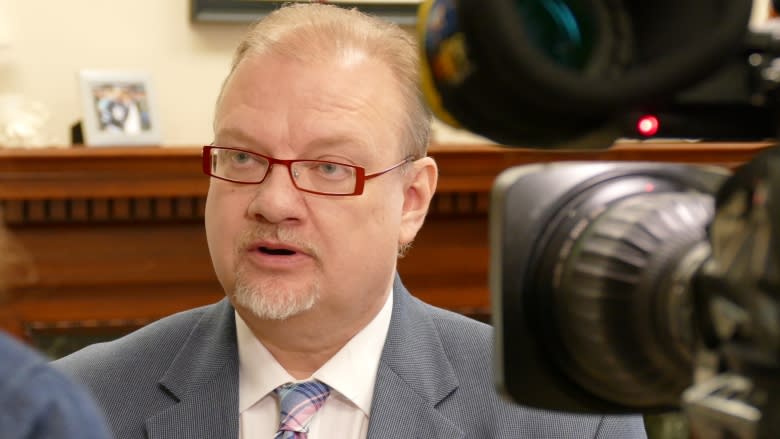Sprague man relieved after province says it will cover bulk of U.S. medical bill
A southeastern Manitoba family is celebrating after learning they're no longer on the hook for a large part of roughly $118,000 in medical costs racked up after seeking emergency treatment in the U.S. last fall.
Robin Milne was sent the massive bill after he travelled to a U.S. hospital near his home in Sprague when he suffered a heart attack last October. He thought his treatment would be covered by an agreement Manitoba has with two U.S. hospitals near Sprague.
On Thursday, he was in the Manitoba Legislature with his son Kevin, hoping to get a meeting with Health Minister Kelvin Goertzen when the minister announced the family didn't need to pay a large portion of the bill — the chunk of the bill associated with medical costs.
They may still have to pay $48,000 in transportation costs, though, Kevin Milne said.
"[It was a] pretty stressful moment, actually, to be honest with you," he said later Thursday. "Because it seemed like, oh, if this isn't real, this excitement is for nothing. It was surreal, I guess."
It's unclear who covered the bill, or if the province negotiated to have it lifted.
But Kevin Milne said his father is ecstatic
"When he realized it was actually true, he was very emotional," he said. "He just obviously felt like finally something has come good out of this for him."
On Thursday, Goertzen told CBC he had recently travelled to Roseau, Minn. — where Milne originally went after suffering his heart attack — to meet with officials of the U.S. health care provider Altru and LifeCare, the U.S.-based emergency flight service that ended up transporting Milne from Roseau to Grand Forks, N.D.
Milne said he was under the impression he would be covered for emergency medical care in the U.S. under what's called the Altru Agreement, which allows residents in Manitoba's southeastern-most communities to have their medical costs covered in Roseau or Warroad, Minn. in the case of an emergency.
"As a result of those discussions around the operation of the Altru contract, and given the specific and exceptional circumstances of Mr. Milne's case, there are no hospital and medical bills outstanding for Mr. Milne," Goertzen said in a statement emailed to CBC by his office.
"Further discussions are ongoing with the medical transport company regarding their invoice."
More information, consultations coming
Robin Milne was left with the hefty costs after he suffered chest pains last October at his home in Sprague — a southeastern Manitoba town about four kilometres away from the Canada–U.S. border — and was rushed to a hospital in Roseau, about 25 kilometres away.
The doctors in Roseau were unable to perform a potentially life-saving heart stent procedure and requested an emergency plane from Winnipeg to pick Milne up and take him to St. Boniface hospital. But after 90 minutes without word from the hospital, doctors in Roseau advised him to head to Grand Forks, where the procedure could be performed.
Milne thought the Altru Agreement would cover the costs of the U.S. medical care.
But in the weeks that followed, officials with Manitoba Health said the agreement only applies to treatment and stays in the two Minnesota hospitals — not the Grand Forks hospital — and wouldn't cover the flight to Grand Forks from Roseau.
Goertzen has previously said his hands were tied and the province wouldn't be able to cover Milne's bills, but he planned to meet with U.S. medical officials and Altru staff to see if the sum could be renegotiated.
Goertzen also previously stated he wanted a review of the Altru Agreement. The most recent incarnation of the deal was signed in the late 1990s and needs to be revised, Goertzen had said.
On Thursday, Goertzen said there are "continuing discussions" with Altru on the application of the agreement. He said there will be more information and consultations with the residents of the rural municipality of Piney, which includes Sprague and other border communities.
"Additional clarity about eligibility for coverage and services is needed for both residents of Manitoba and the service providers in the United States to ensure similar unfortunate incidents do not occur," Goertzen said.


